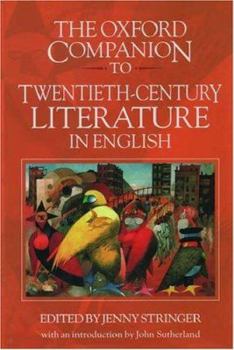The Oxford Companion to Twentieth-Century Literature in English
Select Format
Select Condition 
Book Overview
Oxford Companions are known for their authority, comprehensiveness, and browsability--"the best reference books in the language," according to Harper's. Perhaps the most well-known Companion of all has been The Oxford Companion to English Literature, now in its revised fifth edition. But the literary canon isn't static, and modern literature in all of its richness demands a more comprehensive Companion to cover the wealth of contemporary writing crafted...
Format:Hardcover
Language:English
ISBN:0192122711
ISBN13:9780192122711
Release Date:October 1996
Publisher:Oxford University Press
Length:772 Pages
Weight:3.05 lbs.
Dimensions:1.9" x 9.4" x 6.4"
Customer Reviews
1 rating
Unusual companion recognizes influences outside literature
Published by Thriftbooks.com User , 24 years ago
Oxford has published a number of literary reference books, each with their strengths, weaknesses and biases. There are "Companions" to American literature and English literature, the gossipy and Brit-biased "Reader's Guide to Twentieth Century Writers," and now this prose atlas to the century's notable writers in English. It is, in a literary way, an embarrassment of riches. Describing this extensive overview of everything worth noting about 20th century literature in English can be compared to the blind men describing an elephant. So much to cover, so many varieties of prose, and so little space to describe it all. The giants are here, and if greatness is measured by the space allotted to them, then D.H.Lawrence leads, with two full pages dedicated to his achievements, followed by James Joyce, T.S. Eliot and Joseph Conrad (11/2 pages), Henry James (11/4 pages), and Graham Greene, William Faulkner and W.B. Yeats with one page. At the other end of the fiction scale, where bestsellers reign, can be more problematic, with some authors worthy of inclusion (John Grisham, Scott Turow, Stephen King, a lonely line next to Barbara Cartland's name that refers the reader to the "romantic fiction" section) and others not (Michael Crichton, John Jakes, Danielle Steel). Genre writers tend to stand a better chance of inclusion, such as Georgette Heyer (romance), Jack Vance, Ursula K. LeGuin and Michael Moorcock (fantasy), J.G. Ballard, James Tiptree and Robert Heinlein (science-fiction), and Sara Paretsky, Tony Hillerman and John Mortimer (mystery). Editor Jenny Stringer also went out of her way to include notable persons outside of literature -- The Beatles, Harvey Fierstein, Hunter Thompson, Tony Kushner and Theodore Veblen are in here -- as well as institutions, magazines and literary movements. Identifying these movements can sometimes be an exercise in deciphering obscure meanings. The entry on Modernism, for example, defines clearly its practitioners. Their works, however, "indicate the breach with the conventions of rational exposition and stylistic decorum in the immediate post-war period." Nowhere is there a phrase as clear as (and this is taken from an upcoming Oxford reference on James Joyce): "[Literary modernism] interrogates the legitimacy of traditional social institutions such as the family, the church and the state, rejecting their authority to prescribe and enforce moral standards of behavior."Apart from that caveat, this Oxford Companion is a worthwhile aid through 20th century literature. Which one that is right for you depends entirely on where your taste in literature lies. It is only safe to say that there isn't a better guide anywhere.





